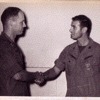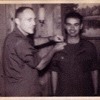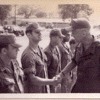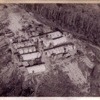

If you see this message, that means that you either do not have the latest version of Adobe Flashplayer installed (install it here) or you have blocked the ActiveX control for Internet Explorer. Please reload the page and allow the control.
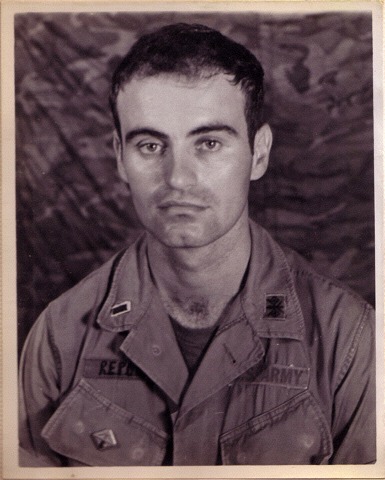 |
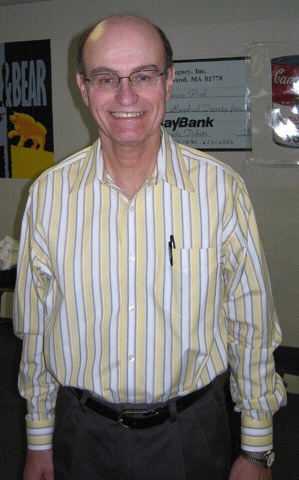 |
|
| Mr. Repose in 1969 | Mr. Repose in 2007 | |
| Repose describes what it was like returning to the U.S. | Repose talk about the Vietnam civilians. |
Richard Repose was born in Lowell, Massachusetts in 1944. He later moved to Chelmsford and graduated from high school in 1961. He went to college and studied engineering and business. In fear of becoming thrown into the front lines in Vietnam, he joined the Officer Candidate School, after which he began training as a signal platoon leader. He was sent to Vietnam from 1969 to 1970, during which he served as the platoon leader of 124th Signal Battalion of the 4th Infantry Division, maintaining communication equipment and providing supplies. He was among the most fortunate to not have lost anyone in his battalion or seen anyone die during his time in Vietnam.
Repose Gallery
(Click images to enlarge)
Q: This is Tyler Fisher and Brett Stein, and we are here at Wayland High School interviewing Richard Repose on May 23, 2007. Please, state your name.
Mr. Repose: Richard Repose.
Q: When were you born?
Mr. Repose: I was born in 1944.
Q: Could you describe where you grew up? What was your child hood like? Siblings? What did your parent do for work? Was your father in World War II?
Mr. Repose: I was born in Lowell, Massachusetts in 1944, and I lived there for my first nine years. And then my parents bought a house in Chelmsford, and I spent the remainder of my growing up years in the town of Chelmsford, graduating from Chelmsford High in 1961.
Q: Did you have any siblings?
Mr. Repose: I am an only child.
Q: As a teenager how aware were you of world events?
Mr. Repose: I always had a keen interest in social studies and world events.
Q: What did your parents do [for a living]?
Mr. Repose: My dad was in the furniture business. He was in charge of the finishing department at the company that he worked for. And my mother was a stay-at-home mom, housewife.
Q: Was your father in World War II at all?
Mr. Repose: He was not in World War II. He was a little too old to be drafted. He had a job that… apparently, they had a navy contract for furniture or something like that, so he was involved in that.
Q: When did you first hear about the Cold War? Did you dislike the Communists or fear them?
Mr. Repose: I don’t know…I probably heard about the Cold War when I was in grammar school because it started about when I began school, which was just after World War II.
Q: And the Communists? Did you fear them or dislike them? Or were you…
Mr. Repose: We all did. We were all very afraid of the Communists. We didn’t want them in our backyard.
Q: So the general state of the country was [that] everyone was afraid of the Communists?
Mr. Repose: I think so. Everyone I think had a healthy fear of the Communists and some things happened during that time because some people were afraid of the Communists.
Q: Were there any important people that really impacted you around that time?
Mr. Repose: I remember President Harry Truman, [and] I remember President Dwight D. Eisenhower. I remember some things about the Korean conflict, which was also an anti-Communist effort.
Q: What were you plans upon graduating from high School?
Mr. Repose: Upon graduating from high school, I went on to college.
Q: And what were you planning to do there?
Mr. Repose: In college, I started out in engineering and didn’t do very well there, and in the end I got a degree in business.
Q: So what do you remember of the Korean War?
Mr. Repose: Very little. Actually, I was…I don’t know…about eight or nine years old when it ended, and I remember there were a couple of guys from the neighborhood that were involved in Korea, and I remember hearing the older men talking about it. There was some television back then. I remember seeing a little bit on television.
Q: When did you first hear about the conflict in Vietnam?
Mr. Repose: I first heard ‘bout the conflict in Vietnam…I think…during the early 60’s was our first involvement over there. It wasn’t troops in battle. It was our soldiers over training the Vietnamese soldiers. That’s what it was.
Q: Did you worry about how it might impact your future?
Mr. Repose: Oh, yes! There was a draft, and, you know, I was concerned [that] one day I would finish school, and I’d be drafted and have to serve in the military.
Q: Is that how you got involved in the service? You were drafted?
Mr. Repose: I was about to be drafted, and I went down to see the army recruiter, and they had a good program called Officer Candidate School, so I signed up for that. I got a commission through OCS.
Q: Where there benefits in that program? Was it better to be in that program than to get drafted out of nowhere?
Mr. Repose: I think so. If you got drafted out of nowhere, you don’t know where you would end up, and I felt that being offered a chance to get a commission in the signal core would at least keep me out of the front lines. So that was my thinking back then.
Q: How did you end up as a platoon leader in the fourth infantry division?
Mr. Repose: Well, after Officer Candidate School, my signal training began, my training with communicated equipment and command and so forth. I was trained as a forward area signal platoon leader, and by forward area they meant that you would probably be with a brigade of an infantry division. Okay? That’s probably as forward as we would go. Actually, we ended up…when we got there to Vietnam, we ended up going a little bit more forward than [we were supposed to so] that we actually supported some battalion, which is a next smaller unit down, and I was not a combat soldier. I was a leader of men who maintained the operation of certain equipment that would allow the commanders at the firebase we were at to communicate by telephone to their higher command.
Q: What was the basic training like just when you…when you were learning to be – obviously, you weren’t going to be a soldier, but what kind of things did they teach you?
Mr. Repose: Well, when I first joined the army, I went through the regular recruit basic training, and I also went to advance infantry training. From there, I went to infantry Officer Candidate School because they had closed the Signal Officer Candidate School. But because I had it in writing that the army…when I finished that training, I was commissioned as a signal officer and not an infantry officer. So, I wound up being trained in both and never having to use the infantry training very often.
Q: What was it like? Was it very tough and stuff, or…?
Mr. Repose: Well, you never knew what was going to happen from one day to the next. Where I was basically spending most of my time [was] at the division base camp, which is the headquarters, and some of the time out on the field, which was the battalion and brigade firebases, smaller places. You know, your life was in danger, but you never knew how close.
Q: How was the transition from America to Pleiku like?
Mr. Repose: From America to Pleiku?
Q: Mhmm.
Mr. Repose: Well, in Pleiku, for some strange reason, they had flush toilets, but nowhere else. So it was like camping.
Q: So it was much different from other parts of Vietnam?
Mr. Repose: Well, the only parts of Vietnam I saw were Pleiku, An Khe, and I spent maybe a couple of day on the coast I think it was a place called…I don’t remember the name of the town on the coast. The coast was very different. It was a lot hotter than up in the central highlands.
Q: How did you feel when you first got to Vietnam? What was the transition like?
Mr. Repose: I don’t know if I felt frightened or excited. I probably could have picked better places to go like Europe, but you have to go where they send you, so they sent me to Vietnam, and I was looking forward to getting involved, and hopefully the time would go quickly.
Q: So were your men in combat?
Mr. Repose: My men were not in combat. My men were basically equipment operators, drivers, that sort of thing.
Q: So you didn’t lose anybody dear to you?
Mr. Repose: No, I did not – very fortunate.
Q: Did you believe in the Domino Theory that once one nation fell, the rest would go with it?
Mr. Repose: I don’t think so. I mean, I don’t remember exactly what I believed back then, but I probably did not believe in the Domino Theory. It’s hard to remember exactly.
Q: What was it like when you left the U.S. to go over? When you were saying goodbye to friends and family?
Mr. Repose: It was very difficult. I remember that day at Logan Airport in Boston—I still remember that day…with my parents, and my mother broke down crying, and it was hard, very difficult, to leave. Coming home was easier than that, but going was very tough, very tough.
Q: The NVA and the VC were…they fought very tough against U.S forces. Did you see them more as Communists [trying] to spread their political systems, or did you see them as nationalist trying to protect their own country?
Mr. Repose: They seemed to be more nationalist trying to protect their own country. I had no contact at all with any VC or any NVA soldiers, but I don’t think I saw any. But they seemed to be more nationalist than anything else.
Q: How did you pass the time while you were in Vietnam?
Mr. Repose: Well, [we were working] seven days a week, about 12 hours a day, so you were kept busy with lots of things to do. That’s about all you had time for was to sleep and we did have an officer’s club at the base where you could go when you had free time, but I don’t remember having a lot of free time over there.
Q: How long exactly were you there for?
Mr. Repose: One year exactly.
Q: Broadly speaking, what do you think the U.S. forces were there for in general?
Mr. Repose: Well, there were some days I would say to myself, “what in god’s name are we doing here?” What exactly our division’s military mission was, I don’t remember. I don’t think I was told because I really didn’t need to know, but basically our troops seemed to have relations to whatever was going on in the surrounding area, okay? We did have one mission where we had to move our base camp from where it was in An Khe to the Cambodian boarder with Vietnam, and, at that time, our troops were not invading to capture the government but to stop North Vietnamese and VC from infiltrating across the boarder.
Q: Do you remember what the Ho Chi Minh trail was?
Mr. Repose: Right, the Ho Chi Minh trail started in North Vietnam, wound its way through Laos, into Cambodia, and then into South Vietnam. I don’t know much about it—much about the Ho chi Minh trail. It was considered a route by which infiltrators could get into South Vietnam.
Q: How was the morale of the troops that you were around?
Mr. Repose: The morale of the troops in the signal battalion, I think, [was] higher than [that of] the front line troops. You would see front line troops from time to time, and, at times, they looked dirty and tired. That’s a tough job being an infantryman because you’re on the move, constantly, with little time to rest, and probably the food isn’t the best when you’re traveling like that. So, I think, as signalmen, we felt sorry for the infantrymen a bit.
Q: Being a platoon leader, did you feel kind of a certain responsibility to try to keep the troops’ morale higher?
Mr. Repose: Yeah, I tried to keep them away from drugs. You know, that was a big thing over there was drugs, particularly marijuana, and I don’t remember what else they had back then, but there was that concern.
Q: Did you ever have to punish them?
Mr. Repose: Yes. Yeah.
Q: What kinds of things would you do?
Mr. Repose: To punish them? Well, I wouldn’t punish them directly. That was the company commander’s job. The typical punishment would be reduction in rank, which would mean a cut in pay.
Q: So did most of them do marijuana? Or was just an okay amount, like a little?
Mr. Repose: Well, you know, in the company area we would find, occasionally, in hiding, some bags of marijuana or grass, whatever you call it, so we knew it was around.
Q: During Lyndon Johnson’s term he escalated the troop count from [19]63 to [19]68…he escalated the levels to 520,00 by 1968. Did you think that that was enough to win the war?
Mr. Repose: I don’t remember what I thought, but I do remember [that] while I was there in 1970, they did reduce our division from three battalions of infantrymen down to two. So, I was there during the period when there was a reduction in troop forces.
Q: So the Civil Rights movement…it was a big thing over in America while you were in Vietnam. How did racial differences play out among the troops in Vietnam?
Mr. Repose: Which question do you want me to answer first?
Q: Well, it’s just how the civil rights movement was very big in America during that time…
Mr. Repose: Yea, I remember that, and, when there would be a large demonstration here, that’s when we would get attacked the most.
Q: Why do you think that was?
Mr. Repose: I think that anytime that the Americans would speak out against the enemy…it kind of incites them to try to do better against us, but they didn’t succeed. I don’t think they succeeded.
Q: So how’d you feel about the protestors back at home?
Mr. Repose: I felt that they were doing the right thing even though we were getting hit harder…I felt it was in our interest.
Q: So, when you came back, did you feel like you deserved a certain amount of respect that you weren’t getting? Or did you understand why people —
Mr. Repose: I understood. Yeah, I understood. There were some people that were very welcoming and there were some who [acted like] one gentleman, who, in particular, acted as if I never left. That’s his way of dealing with it, I suppose, but it didn’t bother me. I knew what to expect.
Q: Did you guys ever feel like the war would ever end?
Mr. Repose: Well, that’s the question. Being over there as a soldier day after day, you wonder: is this war ever going to end? Because it seems like you’re doing about the same things now that you were doing six months ago. So, you wondered when it would come to an end.
Q: Did it seem like the people that were telling you what to do had a clear focus of what the result might be? Or did it just seem like people were telling you what to do because people were telling them to tell you stuff?
Mr. Repose: Basically, what we were. We were a support function, and if the infantry needed us or the artillery needed us, we would go to them and give them what they need, so we never really had a clear idea as to what was going on – except [in] the Cambodian invasion [where] we were told beforehand what we were going to be doing and where we were going and so forth.
Q: So, what did you do during the invasion?
Mr. Repose: We were at an alternate base camp on the boarder sleeping below. Whenever you were in a firebase or whatever the division required, everyone to sleep at night below the ground. So, I think we were in a hole that was dug by a bulldozer, and we had cots and stuff. So we slept on cots below ground with a tent over us. Not very plush, but got the job done…
Q: Was it really intense…?
Mr. Repose: No flush toilets either. It’s like camping.
Q: So was it really intense there, more than usual?
Mr. Repose: Well, where I was, there wasn’t a whole lot going on, but I could see the helicopters with the troops going back in forth, back and forth and you could see smoke rising, and occasionally you could hear gunfire.
Q: Was there fighting all the time there?
Mr. Repose: From where we were, no. Sometimes it would be quiet, but it was kind of scary because you never knew what was going to happen next.
Q: Did you feel like you were in danger?
Mr. Repose: Probably. I had some troops that were a couple miles away. They were operating a relay station, and I was concerned about them. I remember going out there to visit them, make sure they were all right, and sending other people out there to make sure they were okay.
Q: So when you look back at the whole experience is there one situation or just one picture in your mind that you think about when you think about your time there?
Mr. Repose: What I picture in my mind is our battalion area in An Khe at a place called Camp Radcliff. That was the place we were at. I have a vivid picture in my mind of that camp, how it was. There was a little hill behind the BOQ. That, the Bachelor Officers Quarter… that’s where I slept. I remember that. I don’t know what they used that hill for; I didn’t use it. That somehow stuck in my mind. And the battalion area, where, you know, we assembled, sticks in my mind. I thought that, overall, the experience was good because I got some leadership experience which I never had in my life, so I thought that was good, and, at the same time, I served my country, I did my job, I did what I could.
Q: So why where An Khe and Pleiku so important?
Mr. Repose: Well, when I arrived in Vietnam, the fourth infantry base camp or division was at Pleiku, and, a couple of months later, we moved down to An Khe, which was closer to the coast.
Q: Do you remember Nixon’s peace with honor strategy?
Mr. Repose: No, I don’t.
Q: So were you over in Vietnam at the times of the Vietnam shooting?
Mr. Repose: What year was that?
Q: 1970.
Mr. Repose: Yeah, I must have been.
Q: Do you remember if that had any impact [on] how the troops were?
Mr. Repose: I don’t recall.
Q: Did you have any strong opinion overall on the whole tragedy?
Mr. Repose: I don’t remember. I remember hearing about the event, I don’t know where I was when I first heard about the event, but I don’t know what my reaction was.
Q: When many vets returned, they were labeled as baby-killers and all kinds of terrible names. Do you remember knowing anyone that was called that, or how you felt about-maybe not you in particular, but troops as a whole being called that?
Mr. Repose: No, I-When I returned I did the best I could to fit in and not stand out. I vaguely remember some of the name-calling. Do I agree with it? No, most soldiers over there were fighting for their lives. You know, these were young fellows, these guys were nineteen years old, on the average, not much older than you are, and they were trained infantry men and they were carrying the load over there. They didn’t deserve to be called “baby killers.” I mean those incidents happened, and those people either were punished or should have been, but I don’t thank that that applies to the whole military force that was over there.
Q: So do you feel that it was easy to integrate back into society?
Mr. Repose: I felt it was very easy; I was welcomed home by my parents and friends, and so forth, and I didn’t have any problems. I think the greatest thing was that I didn’t endure seeing any of my friends killed, or injured, or anything like that. Those impressions are lasting, that would be like seeing someone…seeing your best friend [get] hit by a car and killed, or something like that.
Q: How much had changed in America since you were over in Vietnam to when you returned?
Mr. Repose: I didn’t notice any change. One year, I really didn’t notice any change…nothing that
stands out anyway.Q: Have you been to the Vietnam Memorial Wall?
Mr. Repose: I have. The one in Washington DC?
Q: Yeah.
Mr. Repose: I have.
Q: What was that experience like for you?
Mr. Repose: I found a couple of names of men that I went through officer candidate school with. One was a student, like I was, and the other was a training officer.
Q: Was that hard to deal with?
Mr. Repose: I don’t remember it being hard to deal with. I just felt bad about the whole thing. I didn’t take any of this personally. I think that was the best way to deal with it, you know? If you’re ever in a situation like that, just try not to take it personally, if you can.
Q: Did you keep contact with people or go to any reunions or anything like that?
Mr. Repose: Unfortunately, no. There were a couple of letters and maybe Christmas cards. Pretty much I have lost contact with everybody. It’s too bad.
Q: Did you join an organization or anything like that?
Mr. Repose: No, I did not…
Q: Today, we’re a nation at war. Do you see any parallels between the war over in Vietnam and the war now?
Mr. Repose: I sure do. I think that people, in general, are supporting the troops more, but they’re not supporting the war. They want the troops home for their own safety.
Q: Do you think that we should have learned something from the war in Vietnam, being [that we’re] in a similar war today?
Mr. Repose: Oh, definitely. I personally was not in favor of that war when we first started. I was against it. I still am. I think it was ill-conceived, I don’t think that Iraq was ever any threat to the US or the security of the US. Therefore, we had no reason to go over there and invade that country. It’s resulted in catastrophe. Many of our soldiers have been killed, wounded, maimed, lost arms and legs…how much fun is that?
Q: Not fun.
Mr. Repose: No.
Q: So it sounds like you’ve learned some lessons from Vietnam.
Mr. Repose: How to stay out of a fight, yeah. I favor negotiation over war any day.
Q: So how did you react to the role that Vietnam played in the presidential campaign in 2005?
Mr. Repose: I don’t know, did it? Kerry, like me, is a Vietnam veteran. He saw more action than I did, and yes, he is a hero, I never doubted it for a minute. But it didn’t seem to have much effect because President Bush, who was for the war, got re-elected. What can I say? The vote had spoke.
Q: You were saying before that you kind of felt better by the whole experience because you gained some leadership skills and stuff…
Mr. Repose: Skills that I would never get here.
Q: Do you view the whole experience now differently than you did right after you finished your time there?
Mr. Repose: No, I still feel [as though] I served my country and as though I got something out of
it. I still…I’m okay with it. I don’t have any regrets or bad memories. I feel badly for those who were killed and didn’t come homeQ: [Were there any people who had the same job as you] who weren’t as fortunate as you were to come home safely?
Mr. Repose: You mean people that I had met?
Q: Just people that were platoon leaders or people that had your… position and responsibilities?
Mr. Repose: That were killed?
Q: Yeah, that were killed.
Mr. Repose: Nobody that I served with over there was killed, but I happened to be going through the history of one of the companies in the 124th battalion, and there was a platoon leader who was killed. He was on a road going from one firebase to another, and I think he was hit – he was ambushed. And that can happen because you got to get from one place to another, and the safest way, I thought, over there, was to take a helicopter ride if you could get one, but there were times when you couldn’t because there wasn’t one available or you had equipment or other men that you had to be with. So you had to take the road, and it was always dangerous taking the road, and I think that’s where that fatality happened…was on the road. But that was the only one that I heard of. [inaudible] Again, out on the road, you’d get hit. Sometimes you’d get out of your vehicle, sometimes you’d stay where you [were], depending on what you were told to do. One of our soldiers was actually involved in saving lives, and he got a medal for doing that, so that was nice.
Q: Do you think your position as platoon leader changed your perception of the war in that you were safer at most times than, say, the soldiers who were on the front line [were]. Do you think that changed your perception of the war?
Mr. Repose: I don’t think so, I was never for the war, but I did my duty as a soldier. I did what I was told to do.
Q: So did you meet any Vietnamese people?
Mr. Repose: Oh yes, many of the Vietnamese were hired to work on the base camp, most doing cleaning because we did the cooking. They were mostly involved in cleaning chores and stuff like that – yes, I did. They would come and actually clean my room, where I slept,…these were young women, and I remember them vividly.
Q: What was your attitude toward them?
Mr. Repose: I felt sorry for them. At that time, that part of Vietnam was a very poverty-stricken area. Americans lived a lot better than that. The Vietnamese perception of us was that we were all wealthy people and they were poor. They were very nice people, very respectful, I can’t remember having trouble with any of them. We also had in that part of Vietnam-central highlands…there were also tribesmen up in that area, and these were people who lived in huts basically their whole life, trying to eek out a living. Different from the Vietnamese townspeople who were a bit more sophisticated, lived in actual houses that were constructed instead of huts.
Q: [Were the people who lived in huts safer than the actual townspeople?]
Mr. Repose: I don’t think so, I think they were caught up in the bad stuff as well as the Vietnamese, but they seemed to separate themselves from all of it. They were very friendly towards us, because we game them food… and we actually had an organization that went out to these villages and tried to help them.
Q: How did you feel when the troops left and didn’t bring back…?Mr. Repose: I felt bad for the-you mean 1973 when we left?
Q: Yeah
Mr. Repose: I felt very badly for the Vietnamese citizens who wanted to be like us, they wanted to be free. So many of them have made it to the United States that it’s made me happy to see the Vietnamese. I work with [a couple of Vietnamese people]. It’s nice to see that some of them have made it to the United States, safely.
Q: So going back, did you find that it was easy to escape the draft for most people?
Mr. Repose: For some people. When your college ended and you graduated, you were in the draft there was nothing you could do about it-except if you wanted to go to graduate school or something like that, and I didn’t care to do that. So I said, “well I’ll go into the military and get it over with, and start life,” which is what I did.
Q: So what was your view of the presidents during the war?
Mr. Repose: Like President Nixon and President Johnson?
Q: Yeah.
Mr. Repose: Well, I wasn’t in favor of those two gentlemen because they were for the war, they were pushing it, and I thought that a long time ago we probably should have gotten out of there.
Q: Do you remember Kennedy at all?
Mr. Repose: Yes, John F. Kennedy. I certainly do, I certainly remember the day that he was killed-that he was assassinated, sad day, a very sad day. Remember the sadness that you felt on [September 11th?] That’s how it was when Kennedy was assassinated, it was that bad. We all liked President Kennedy… it wasn’t fun being over there, but it wasn’t that bad for me, in comparison to some of the others, so I think I got off easy. There was a lot of Malaria going on over there, so I took those anti-malaria pills every day.
Q: Did everyone else do that?
Mr. Repose: Some of them didn’t, and some of them got malaria.
Q: Did a lot of people get sick from malaria?
Mr. Repose: A few, one of them kind of had a-like a nervous breakdown, and it took weeks for them to get him out of there to an Army hospital in the states. He was very depressed, and he [could] hardly function. He would eat and that would be about it, so finally he got sent home. Because he just couldn’t take it anymore-he couldn’t adjust-that was the whole problem.
Q: What was the food…was it any different?
Mr. Repose: We had very good food, I thought for army cooking. Our particular battalion had it’s own, we called them mess halls, they’re cafeterias here, restaurants or whatever. I thought the food was really good… lots of beer.
